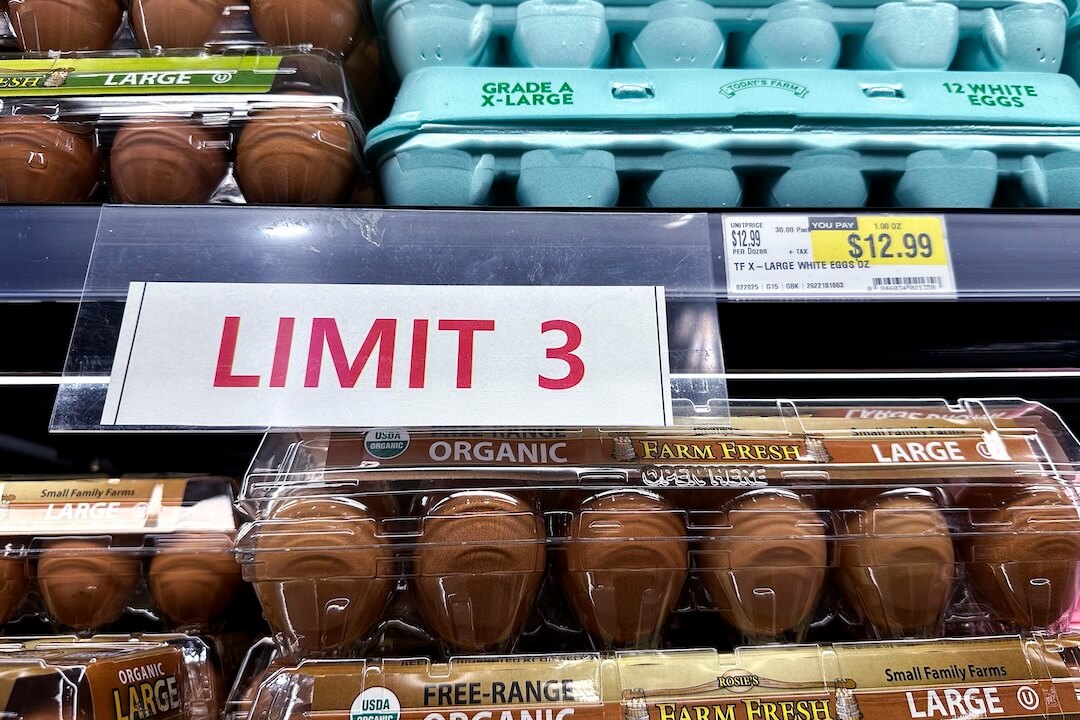As President Donald Trump promoted his tariff hikes in an April 2 Rose Garden address, he veered back to a favorite 2024 campaign topic: egg prices.
“The egg prices came down 50%,” he said, praising Agriculture Secretary Brooke L. Rollins. “You got them down 50% once we got involved, they were going through the sky, the egg prices, they were going through the sky, and you did a fantastic job. Now we have lots of eggs, and they’re much cheaper, down about 59% now, and they’re going down further.”
During the Biden administration, more than 100 million egg-laying chickens died from bird flu or were killed to stop the virus’ spread. Flock-culling is standard practice employed by presidents in both political parties for addressing bird flu. But the prevention measure under Biden led to egg shortages and higher prices.
Some social media accounts mocked the Trump administration for celebrating egg prices while the stock market tanked. But the most recent data on wholesale egg prices lends some support to his numbers, even if retail prices have yet to drop. That drop is likely to happen.
“There is a lag between the retail and the wholesale price,” said Jada Thompson, University of Arkansas associate professor of agriculture economics. “Retailers ultimately set the final price we see as consumers. I’d expect a few weeks to fully transition the price. It takes some time to move products off the shelf that were purchased at a higher price, but as they do the prices will start coming down.”
Wholesale prices have dropped
When contacted for comment, a White House spokesperson pointed to Agriculture Department data showing the national wholesale price for a dozen large, white eggs.
On Jan. 21, Trump’s first full day in office, that price was $6.55. On March 28, it was $3. That’s a decrease of more than 50%.
Consumers aren’t necessarily experiencing this price decline at the check-out register yet.
The federal Bureau of Labor Statistics’ latest data showed the February retail egg prices were about $5.90 for a dozen grade A, large, up from about $4.90 in January, that’s up about 16%. That price is also higher than December’s Biden-era $4.14 and higher than the $4.82 peak price in January 2023.
The good news for consumers is that retail egg prices are likely to drop in the coming months. The Agriculture Department’s most recent March 28 weekly egg markets overview said because “wholesale price changes can take up to three weeks to be reflected in the retail dairy case, consumers are only now starting to see shelf prices slowly decline.”
University of Central Arkansas economic associate professor Jeremy Horpedahl put that delay at four to five weeks.
“This isn’t a hard and fast rule, and it could be delayed by increased demand as Easter approaches, and any further supply shocks from avian flu,” Horpedahl said. “But since wholesale prices peaked at the end of February, consumers should start seeing some declines in retail markets right now (and some areas of the country are seeing this, to some degree).”
Eggs are predominantly produced domestically. Horpedahl cautioned, though, that tariffs could have some impact on egg prices, because the U.S. has imported eggs this year to help increase supplies.
Everything in economics, including egg prices, centers on supply and demand, said North Carolina State University professor emeritus Michael Walden, who taught a class about agricultural and resource economics.
The jump in egg prices resulted from the avian flu dramatically reducing the number of laying hens. Initially, people and businesses still wanted to buy eggs, he said, but as high prices persisted, many consumers shifted to other sources of protein.
“In economics lingo, ‘demand,’meaning buying, of eggs dropped, thereby putting supply and demand more compatible and resulting in lower prices,” Walden said. “The ultimate ‘cure’ will be increases in the hen-laying numbers, but that will take time.”
The bottom line, Walden said, the recent egg prices drop is mainly because people were buying less.
The USDA said March 20 that it had taken steps to lower egg prices through easing restrictions and providing money to support farmers.
However, Walden said reduced demand did more to lower prices than any of the department’s actions.
David Anderson, a Texas A&M University professor of agricultural economics, told PolitiFact that the Trump administration’s steps are good moves, but they are more beneficial long term. He also said that neither Trump nor former President Joe Biden should get credit or blame.
“The whole problem here is the occurrence of bird flu,” Anderson said. “If that would not have happened we would not have seen this kind of increase in egg prices.”
Our ruling
Trump said “the egg prices came down 50%.”
The wholesale price of eggs was $6.55 per dozen when Trump took office in January. By late March, it was $3, a decrease of more than 50%.
Retail prices have remained high — $5.90 per dozen in February, the latest data available, which was higher than they were in January and higher than their peak during Biden. Consumers may not yet be noticing these price drops at the register, however experts say they should soon.
The statement is partially accurate but leaves out important details. We rate it Half True.
This fact check was originally published by PolitiFact, which is part of the Poynter Institute. See the sources for this fact check here.








